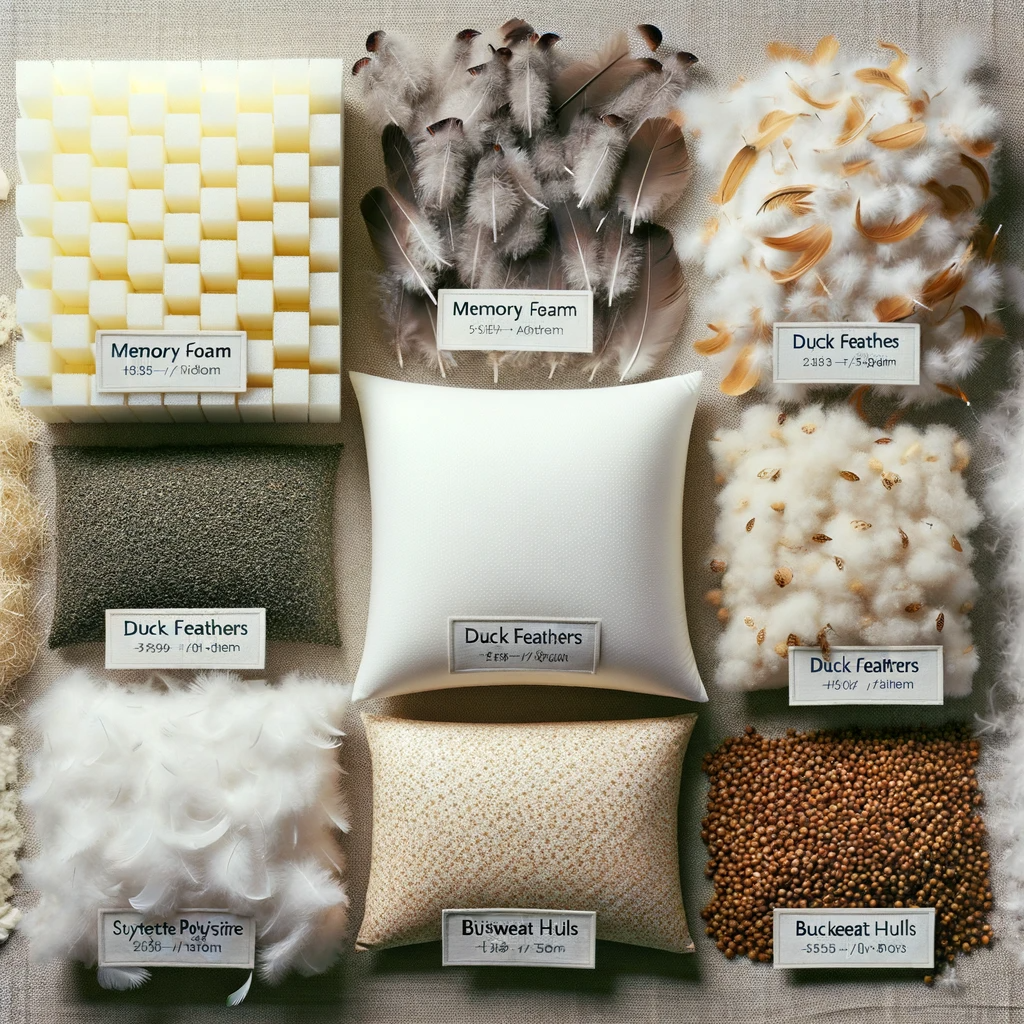Introduction

A good night’s sleep is essential for our overall well-being, and the foundation of a restful slumber lies in the quality of our pillows. Often overlooked, pillows play a crucial role in providing the necessary support and comfort for our head, neck, and spine alignment.
Investing in the right pillow can make a world of difference in how well we sleep and how rejuvenated we feel upon waking. Before delving into the myriad options available on the market, it is important to understand why selecting an appropriate pillow is not merely a matter of preference but rather an informed decision based on individual needs.
Our sleep quality directly affects our physical health, mental clarity, and emotional well-being. Thus, choosing a pillow that aligns with our unique requirements should be approached with thoughtfulness and care.
Importance of a good pillow for quality sleep

A good pillow acts as a supportive cradle for the head and neck during sleep. It maintains proper spinal alignment by keeping these areas in neutral positions throughout the night.
When our spine is properly aligned during sleep, it reduces the risk of developing discomfort or pain in these areas over time. Furthermore, an ideal pillow allows for optimal air circulation to keep us cool throughout the night.
Heat retention can disrupt restful sleep by causing discomfort and excessive sweating. Therefore, finding a pillow that promotes breathability becomes vital to prevent overheating and maintain uninterrupted slumber.
Overview of factors to consider before purchasing a pillow
Purchasing a new pillow can seem like a daunting task given the vast array of options available today. To simplify this process, it’s important to consider several key factors such as sleeping position, body size, preferred materials or fillings, loft or thickness preferences (based on individual factors), and personal comfort preferences. Firstly, understanding your primary sleeping position is crucial in determining the right pillow.
Different sleep positions require varying levels of support to maintain proper spinal alignment. Whether you are a back, side, or stomach sleeper, selecting a pillow that complements your sleeping style will ensure maximum comfort and alleviate any potential strains on your neck or shoulders.
Additionally, considering your body size is essential when choosing the appropriate loft or thickness of the pillow. A person with a smaller frame might require less loft to avoid straining their neck, while someone with a larger build may need additional support to maintain proper alignment.
Other factors like preferred materials or fillings (such as feathers, down, memory foam, latex, or buckwheat), breathability of the pillow cover fabric (important for those who tend to sleep hot), and allergen resistance are also significant considerations when purchasing a pillow tailored to individual needs. By carefully evaluating these factors and understanding their impact on sleep quality and personal comfort preferences, one can make an informed choice when selecting the perfect pillow for peaceful nights and rejuvenated mornings.
Understanding Pillow Types
Traditional Pillows
Pillows have evolved over time, and traditional pillows still hold their place in the market due to their classic appeal and varied materials. Feather pillows, for instance, offer a luxurious experience with their softness and plush feel. They are made from the feathers of birds and provide a cloud-like sensation as you rest your head.
However, it’s important to note that feather pillows may cause allergies in some individuals due to the presence of dust mites or allergens. If you have a history of allergies or sensitivities, it might be wise to opt for alternative pillow types.
On the other hand, down pillows are renowned for their lightweight nature and exceptional fluffiness. These pillows are filled with the soft undercoating found beneath bird feathers.
Due to their lightweight properties, down pillows are particularly suitable for stomach sleepers as they provide minimal resistance against gravity while offering gentle support to the neck and head. For those seeking an affordable yet hypoallergenic option that suits all sleep positions, synthetic pillows are an excellent choice.
Crafted using synthetic fibers like polyester or microfiber fillings, these pillows deliver consistent support and comfort throughout the night. Synthetic materials also make these pillows resistant to dust mites and allergens, making them a safe bet for people prone to allergies.
Memory Foam Pillows
Memory foam has gained immense popularity in recent years due to its ability to mold itself according to your body shape while providing optimal support. Contour memory foam pillows excel at delivering excellent neck support and alignment by conforming precisely to the curves of your head, neck, and shoulders.
The contour design promotes proper spinal alignment during sleep, reducing strain on muscles and alleviating pain or discomfort. Shredded memory foam pillows offer another innovative take on traditional memory foam cushions by enhancing breathability through shredded foam pieces.
This design allows for increased air circulation, making these pillows ideal for individuals who tend to sleep hot or experience night sweats. Additionally, the shredded foam can be adjusted to modify the pillow’s loft, catering to individual preferences and ensuring a personalized sleep experience.
Specialty Pillows
Specialty pillows cater to specific needs and preferences, offering unique features that set them apart from traditional options. Latex pillows, for instance, are crafted from natural latex derived from rubber trees. These pillows are known for their durability and hypoallergenic properties.
The inherent structure of latex provides excellent support without compromising on comfort and conforms naturally to the shape of your head for optimal alignment. Furthermore, latex is naturally cooling due to its open-cell structure, making it an excellent choice for hot sleepers.
Buckwheat pillows offer an organic alternative with their filling made from buckwheat hulls – the outer shell of buckwheat seeds. These hulls conform perfectly to your head’s shape while allowing air circulation through the pillow’s channels.
This unique design helps regulate temperature and reduces the accumulation of moisture during sleep, keeping you cool and comfortable throughout the night. Buckwheat pillows are also known for their ability to alleviate pressure points and provide gentle support.
Understanding different pillow types allows you to make an informed decision based on your specific needs and preferences. Whether you prioritize luxurious softness with feather or down pillows or seek specialized support with memory foam or specialty options like latex or buckwheat pillows, there is a perfect pillow out there waiting to provide you with a blissful night’s sleep.
Determining the Right Loft/Thickness
Factors influencing loft selection:
Finding the perfect loft for your pillow is crucial in ensuring a comfortable and restorative sleep. Two main factors influence loft selection: sleep position and body size.
When it comes to sleep position, each position requires different levels of support to maintain proper spinal alignment. Stomach sleepers, for example, should opt for a low loft pillow.
The reason being that sleeping on your stomach can strain the neck if the pillow is too high, leading to discomfort and potential long-term damage. A low loft pillow helps keep the head aligned with the spine, reducing strain on the neck muscles.
On the other hand, back sleepers benefit from medium loft pillows that support the natural curvature of their necks. With this position, maintaining alignment between the head, neck, and spine is essential for preventing stiffness or pain.
A medium loft pillow strikes a balance by providing enough cushioning while keeping the neck properly supported. Side sleepers require a high loft pillow to fill in the gap between their head and shoulder adequately.
Without sufficient support, side sleeping can cause misalignment of the spine and discomfort in both the neck and shoulder area. The additional height provided by a high-loft pillow ensures that your head remains parallel to your shoulder throughout the night.
Choosing The Appropriate Loft:
Now that we understand how different factors influence loft selection let’s delve deeper into choosing an appropriate loft based on specific sleep positions. For stomach sleepers seeking optimal spinal alignment while they snooze away peacefully, a low-loft pillow is ideal.
Low-loft pillows are typically thinner and provide soft support that does not elevate your head excessively from its natural position. By keeping your spine straight while you rest on your stomach with this type of pillow under your head, you can minimize any potential strain or discomfort upon waking up.
Back sleepers, who often prioritize maintaining the natural curvature of their neck and spine, can benefit from a medium-loft pillow. These pillows provide adequate support to cradle the head without tilting it too far forward or backward.
By keeping your head and neck aligned with your spine, a medium-loft pillow helps minimize the risk of developing pain or stiffness in these areas over time. For side sleepers aiming to bridge the gap between their shoulder and head, a high-loft pillow is recommended.
With its increased height, this type of pillow fills in the space between your shoulder and ear, allowing for proper alignment throughout the night. By utilizing a high-loft pillow, side sleepers can effectively mitigate strain on their necks and shoulders while enjoying restful slumber.
Remember that choosing the right loft for your pillow is crucial for optimizing comfort and supporting proper spinal alignment. Take into consideration both your sleep position and body size when making this important decision.
Comfort Considerations
A. Materials Affecting Comfort: When selecting a pillow, one of the crucial factors to consider is the material used, as it greatly influences comfort. Softness and firmness levels are highly subjective and depend on personal preferences.
Some individuals prefer a plush, cloud-like surface that allows their heads to sink in, while others seek a firmer support for added neck stability. It’s essential to choose a pillow that provides the right balance between softness and firmness to ensure optimal comfort and support during sleep.
Breathability is another key consideration, particularly for those who tend to sleep hot or live in warm climates. Pillows made from breathable materials such as cotton or bamboo-derived fabrics allow better airflow, preventing heat buildup and promoting a cooler sleeping environment.
This feature can help individuals maintain a more comfortable temperature throughout the night and reduce any discomfort caused by excessive perspiration. For individuals with allergies, allergen resistance becomes paramount. Dust mites are common triggers for allergies and can accumulate in pillows over time if proper care is not taken. Opting for hypoallergenic materials like latex or synthetic fibers can significantly reduce the presence of allergens, making them suitable choices for those with sensitivities or respiratory conditions.
B. Pillow Covers/Cases:While often overlooked, pillow covers or cases play an important role in enhancing both comfort and hygiene. Cotton covers are widely favored due to their natural breathability; they promote better air circulation around the pillow while offering a soft touch against the skin.
Additionally, cotton is known for its moisture-wicking properties, helping to keep sweat at bay during warmer nights. In terms of maintenance and cleanliness, removable pillow covers offer an added advantage as they can be easily washed without compromising the integrity of the entire pillow.
Regularly washing your pillow cover helps eliminate dust mites, dead skin cells, and other allergens, ensuring a fresh and hygienic sleeping surface.
Conclusion

When it comes to purchasing a pillow, comfort should be at the forefront of your decision-making process. Consider the materials used, as they directly affect softness, firmness levels, breathability, and allergen resistance. Find a balance that caters to your personal preferences while taking into account any specific needs related to allergies or hot sleeping conditions.
Remember to choose a pillow cover or case made from breathable materials like cotton. This not only adds an extra layer of comfort but also promotes better airflow and helps maintain cleanliness by allowing you to easily wash the cover regularly.
By carefully considering these comfort factors and investing in the right pillow, you can significantly enhance your sleep quality and wake up feeling refreshed each morning. Rest assured that with the perfect pillow tailored to your needs, nights of blissful sleep await you!









